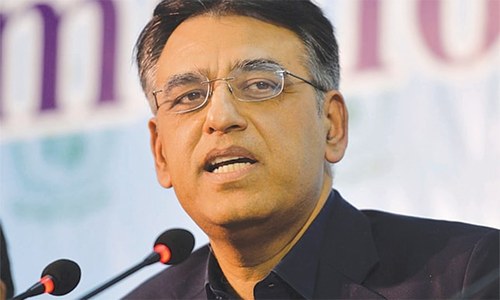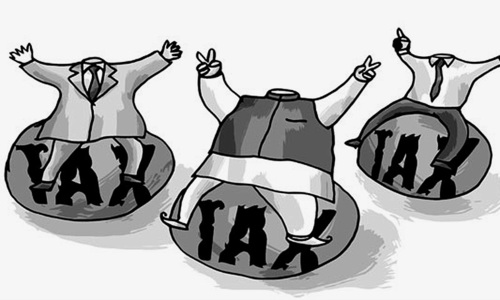ISLAMABAD: The federal cabinet is expected to formally clear the Assets Declaration and Amnesty Scheme 2019 on Tuesday for immediate implementation through a presidential ordinance to be given parliamentary sanction as part of Finance Act 2019 in May-June.
Read: PTI govt’s first tax amnesty scheme ready for launch
A senior government official told Dawn that the revenue division had already secured law division’s support for the draft which would be presented to Finance Minister Asad Umar for mandatory clearance a day before its presentation to the cabinet.
The prime minister had already given a go-ahead in principle for the scheme.
Besides the amnesty scheme, the cabinet is expected to take up a 17-item agenda. This also includes a summary of the finance ministry seeking designation of provincial counter-terrorism departments as Investigating and Prosecuting Agency under Section 2(J) of the Anti-Money Laundering Act 2010. This is to comply with requirements of the Paris-based Financial Action Task Force. An official said the process of taking IMF, FATF and the judiciary into confidence was still ongoing.
Immediate implementation of assets declaration scheme likely through presidential ordinance
Minister of State for Revenue Hammad Azhar on Sunday said the finance minister would hold a briefing on Monday about his recent visit to the United States. He would also be updated on the amnesty scheme to finally decide if it should be introduced through a bill or presidential ordinance, Mr Azhar added.
Another official, however, said the preferred option was presidential ordinance because it would come into force immediately and would be easier to be passed by the parliament as part of the Finance Act 2019-20. This would raise additional funds during the current financial year and the next fiscal year would begin with a clean slate enabling tax machinery to launch a full throttle campaign against tax evasions at the start of the fiscal year.
For this reason, he said, the government had already delayed the Senate and National Assembly sessions. The same method was used for the 2018 amnesty scheme.
He explained that problem with the money bill was that the process of asset declaration and tax payments would remain unimplemented till the passage of the bill by the parliament. This would mean the government facing the shortfall of over Rs318billion tax in nine months would not be able to generate additional taxes this fiscal year.
The official said the scheme would come into force immediately to enable declaration of assets and payment of taxes up to June 30. He said the whole leadership would be required to market the scheme for complete ‘political ownership’ of the coalition partners with maximum emphasis on pushing it as the ‘last chance’ followed by full-scale prosecutions”.
The enforcement of this slogan would be ensured through assistance of banks and National Database & Registration Authority (Nadra) and synchronization of their database to cover the period of undeclared assets.
The scheme has four major objectives. It will help declaration and reporting of undisclosed assets, sales and incomes “for fresh start of tax compliant economy”. Also, it will provide economic stimulus by movement of funds, reduce litigation and enhance revenues without much effort.
The scheme will cover declaration of undisclosed assets, benami assets, sales and incomes on or before June 30, 2018 with tax rates ranging from 5-10pc with certain exceptions but assets would be valued at prescribed rates. “Foreign assets will be converted into money and remitted to rupee accounts in Pakistani banks or deposited into declarants’ own foreign currency bank accounts in Pakistan”. In the previous schemes, the foreign assets were not required to be transferred to Pakistan.
Some of the distinguishing features of the scheme include permission for revision in balance sheets, declaration of Benami assets, sales tax and federal excise duty and settlement of litigation cases. It requires mandatory filing of tax return and cash needs to be put in the bank accounts and there will be a limit of gold declarations to a maximum of Rs5 million. It will also cover bank credits in last five years and declared assets would be based on higher valuation at prescribed rates and tax rates are higher than the previous schemes.
The scheme would be available to all companies and individuals but not to three major categories. Those not allowed to benefit include holders of public office since January 1, 2000, their spouses, children, brothers and sisters or lineal ascendant of descendants. The two other categories include proceeds derived from commission of a criminal offence or cases pending before a court of law with the exception of older pending litigation.
It would allow filing and revision of sales tax return for last completed tax period and declaring last five years undisclosed sales and payment of 3pc sales tax or federal excise. Another condition will be depositing the cash declared in a bank account and retaining the balance till June 30, besides withdrawal of appeals and writs in courts.
Benami assets would need to be declared with payment of 10pc tax while foreign liquid assets to be repatriated into Pakistan would attract 5pc tax. There will be 1pc tax of the total credit entries from July 1, 2013 to June 30, 2018 or 10pc of tax of peak credit entries during the same period whichever is higher.
Likewise, there will be a 2pc tax of the total credit entries in benami bank accounts from January 1, 2017 till April 16-17 (the issue date of ordinance) or 10pc of peak credit entries during the same period whichever is higher. Any other asset declaration would be subject to 7.5pc tax of the prescribed value.
Officials said the amnesty 2018 announced by then prime minister Shahid Khaqan Abbasi fetched a total of Rs124bn taxes from a total of 82,889 people who declared assets worth Rs2.5 trillion despite legal challenges and sunset period of then Pakistan Muslim League-Nawaz government and threats from the Pakistan Tehreek-i-Insaf (PTI) to reverse the scheme and take action against the beneficiaries. This offers a good chance that the new scheme will generate higher proceeds.
They said a total of 76,960 domestic assets were declared last year involving a total value of Rs1.460 trillion and tax amount of about Rs77bn. Likewise, 5,929 foreign assets came to the government record worth Rs1.04 trillion, contributing Rs47bn ($436million) revenue to the kitty.
Published in Dawn, April 15th, 2019

















































